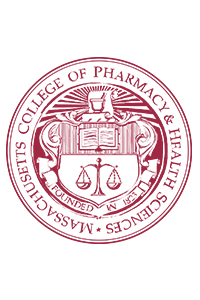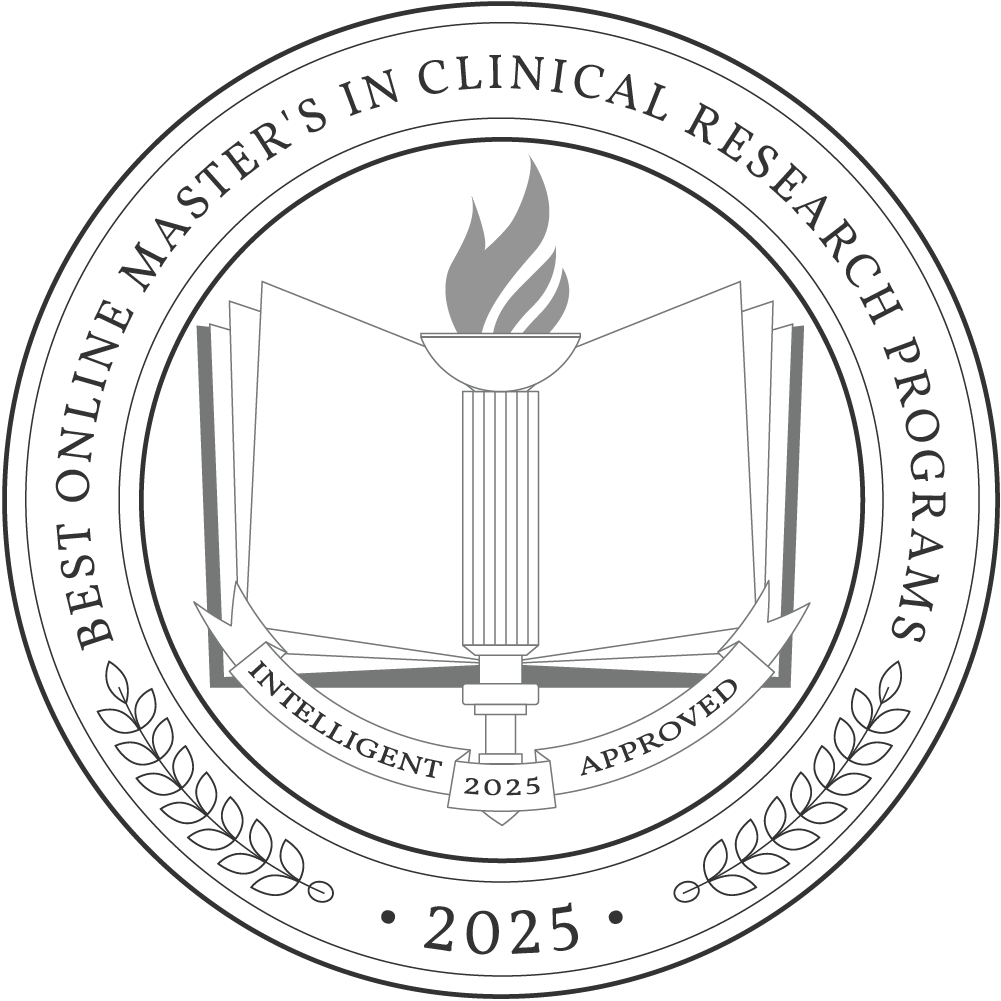Clinical researchers provide leadership and administrative support to medical tests and experiments. They earn a median annual salary of $60,780; most find employment in hospitals or laboratories.
According to the latest data, the average annual tuition for a graduate degree program is $12,596 at public schools and $28,017 at private schools. Most online master’s in clinical research programs are completed within two years by full-time students, with an average course load of 30 to 40 credit hours.
Why Trust Us
The Intelligent.com Higher Education Team is dedicated to providing students with independent, equitable school and program rankings and well-researched resources. Our expert-driven articles cover topics related to online colleges and programs, paying for school, and career outlooks. We use data from the U.S. Department of Education’s College Scorecard, the National Center for Education Statistics, and other reputable educational and professional organizations. Our academic advisory team reviews content and verifies accuracy throughout the year for the most current information. Partnerships do not influence rankings or editorial decisions.
- Analyzed over 2,000 national, accredited, and nonprofit colleges and universities
- 800+ rankings pages are reviewed and updated yearly
- Content is informed by reputable sources, surveys, and interviews with academic advisors and other experts
- Over 100 data points are reviewed for accuracy and quality throughout the year, including sources
How we rank schools
Our list features the best online Clinical Research degree programs at top colleges nationwide. Each school featured is a nonprofit, accredited institution — either public or private — with a high standard of academic quality for post-secondary institutions.
We evaluated each school’s program on tuition costs, admission, retention and graduation rates, faculty, reputation, and the student resources provided for online students. We collected data from trusted sources like the National Center for Education Statistics, individual school and program websites, school admissions counselors, and other data sources. Then, we calculated the Intelligent Score on a scale of 0 to 100 based on the following criterion:
Academic Quality:
- Admission rate versus enrollment rate
- Retention rate of students who return after year one
- Accreditation status (regional and programmatic)
- Nonprofit status, both private and public institutions
Graduation Rate
- Overall graduation rate
- Total number of currently enrolled students, including diversity metrics
- Student-to-faculty ratio
Cost and ROI
- In-state and out-of-state per-credit tuition rates and fees
- Required credits to graduate
- Earning potential after graduation
- Availability of federal student loans, scholarships, and other financial aid options
Student Resources
- Available student services for online-only and hybrid programs
- On-campus amenities like tutoring centers and the number of libraries
Read more about our ranking methodology.
Best 9 Accredited Online Master's in Clinical Research Programs
FiltersInstitution Type
Status
- Intelligent Score
- Alphabetically By University Name
- Acceptance Rate
- Enrollment
- In-state Graduate Tuition
- Out-of-state Graduate Tuition
- In-state Undergraduate Tuition
- Out-of-state Undergraduate Tuition

Ohio State University
Intelligent Score: 99.91In-state: $10,615
Out-of-state: $32,599
In-state: $11,560
Out-of-state: $11,560
SAT: 1210-1430
ACT: 26-32
$968
Online
Higher Learning Commission
36

George Washington University
Intelligent Score: 98.94In-state: $55,961
Out-of-state: $55,961
In-state: $31,770
Out-of-state: $31,770
SAT: 1270-1450
ACT: 30-33
$1,395
Online
Middle States Commission on Higher Education
36

Arizona State University
Intelligent Score: 98.69In-state: $10,710
Out-of-state: $28,800
In-state: $11,720
Out-of-state: $11,720
SAT: 1100-1320
ACT: 21-28
$576
Online
Higher Learning Commission
33

University of North Carolina Wilmington
Intelligent Score: 95.3In-state: $7,019
Out-of-state: $34,198
In-state: $10,552
Out-of-state: $10,552
SAT: 1280-1490
ACT: 28-33
Resident: $277
Non-Resident: $1,120
Online
Southern Association of Colleges and Schools Commission on Colleges
36

Massachusetts College of Pharmacy and Health Sciences
Intelligent Score: 95.28In-state: $39,240
Out-of-state: $39,240
In-state: $47,520
Out-of-state: $47,520
SAT: 1090-1370
ACT: 25-31
$1,160
Online
New England Commission of Higher Education
30

Loyola University Chicago
Intelligent Score: 95.27In-state: $67,818
Out-of-state: $67,818
In-state: $97,480
Out-of-state: $97,480
SAT: 1190-1370
ACT: 27-32
$1,240
Online, On-Campus
Higher Learning Commission
30

Drexel University
Intelligent Score: 94.99In-state: $53,868
Out-of-state: $53,868
In-state: $36,234
Out-of-state: $36,234
SAT: 1180-1380
ACT: 25-31
$1,344
Online
Middle States Commission on Higher Education
36

St. Cloud State University
Intelligent Score: 93.99In-state: $7,505
Out-of-state: $15,921
In-state: $7,607
Out-of-state: $7,607
SAT: 1000-1250
ACT: 18-24
$964
Hybrid
Higher Learning Commission
34

Campbell University
Intelligent Score: 93.33In-state: $34,290
Out-of-state: $34,290
In-state: $14,003
Out-of-state: $14,003
SAT: 1010-1210
ACT: 19-25
$1,060
Online
Southern Association of Colleges and Schools Commission on Colleges
38
How to Choose an Online Master’s in Clinical Research Program
Choose your area of study
This degree is typically offered as a Master of Science (MS). Some programs will allow you to select a concentration and focus your studies on a particular niche in this field, such as epidemiologic research or human genetics. If you already know what you would like to do after you graduate, look for programs that closely match these career goals.
Research schools and programs
You should only apply to institutions that have been approved by a DOE-recognized regional accrediting organization, such as the New England Commission of Higher Education or Northwest Commission on Colleges and Universities. These organizations evaluate schools to ensure they provide students with a high-quality education. Those who attend a school that isn’t regionally accredited may be unable to access financial aid or transfer credits to another institution if needed.
As you research the best program for your educational needs and life goals, you’ll want to consider the program format, technology accessibility, faculty specializations, cost, and student support.
Other questions to ask include:
- Are laboratory clinicals available online, or must they be completed in person?
- Will internships be required?
- Are faculty mentorships available to online students?
- Are there additional costs for online students, such as technology or lab fees?
To learn more about any schools that you’re interested in, you can visit the school’s website, contact an admissions counselor, follow the school on social media, or attend an in-person or virtual open house.
Prepare for tests and applications
Most master’s in clinical research programs require a bachelor’s degree in life sciences or a related field. Schools all have different standards for admissions requirements, with some requesting Graduate Record Examination (GRE) scores while others only need a minimum undergraduate grade point average. Most schools, however, will request undergraduate transcripts, an application essay, and at least three letters of recommendation. A personal statement may be required as well.
Always contact an admissions counselor to ensure you have the most accurate information regarding requirements and deadlines.
Select your program
Before making your final decision, review your needs and goals again. Do you plan to attend school full-time or part-time? Are you only interested in 100% online programs, or are you fine with a hybrid program that has a few in-person requirements? Some programs offer asynchronous courses, which can be completed at your own pace, while others only offer synchronous courses, which involve remotely attending lectures and completing assignments at the same time as other students — which of these two online learning formats do you prefer? Your school should accommodate your scheduling needs and learning preferences.
Determine how you’ll pay for your degree
Talk to your school’s financial aid office about the per-credit cost of your program and whether there will be any additional fees you may not have accounted for in your planning. Some schools charge student, library, technology, or laboratory fees. You may find some of these fees outlined in your student handbook, but your best bet is to contact a financial aid counselor for confirmation.
If you are financing your education, apply for federal student aid by filling out the Free Application for Federal Student Aid (FAFSA). Your financial aid office can also give you information about payment plans, grants, and scholarships that may be available. Those who already work in the field should see if their employer offers tuition assistance benefits as well.
What Can You Expect from an Online Master’s in Clinical Research Program?
The number of credit hours required to complete a master’s in clinical research online will vary with each program, but generally speaking, a full-time student can complete the program within two years. Some programs require as few as 30 credits, while others may require up to 40.
Clinical researchers design research experiments and analyze results, often using computer technology to streamline data and find patterns. A master’s degree in clinical research will offer a deeper understanding of these areas, including site and study management, research design, data management, and research ethics.
In your studies, you may also choose to prepare for the Certified Clinical Research Associate (CCRA) exam offered by the Association of Clinical Research Professionals (ACRP). This certification demonstrates your dedication to the field and enhances your marketability when job searching.
Potential courses you’ll take in an online master’s in clinical research degree program
- Designing Clinical Research Studies. Students will learn epidemiological principles essential to the design of clinical research studies. Topics such as developing research questions, defining the study population, understanding bias, and choosing outcome measures are explored.
- Management of Clinical Trials. Students will discuss core principles of good clinical practice and analyze sections of the Code of Federal Regulations (CFR) related to drug development. This course likely involves on-the-job simulations and an outside project.
- Biostatistics. This laboratory course will teach students how to use data analysis tools and software to explore hypothesis testing, regression analysis, contingency tables, experimental design, and other statistical analyses.
- Regulatory and Compliance Issues. Students will learn about regulatory affairs and the clinical development of drugs, diagnostic devices, and biologics. FDA regulations are studied in relation to taking a product from research to market.
What Can You Do With an Online Master’s in Clinical Research?
Career outlook
The career outlook for individuals with a master’s degree in clinical research is promising, driven by the continuous growth and evolution of the healthcare and pharmaceutical industries. One of the appealing aspects of this degree is its versatility in offering various career paths within the broader field of clinical research and healthcare. Here are some common options:
- Clinical laboratory technician or technologist — Operate laboratory equipment and analyze test results in order to help diagnose, treat, and prevent diseases.
- Median annual salary: $60,780
- Projected employment growth (through 2032): 5%
- New job openings projected: 24,000 annually
- Medical scientist — Help research diseases and develop new drugs.
- Median annual salary: $100,890
- Projected employment growth (through 2032): 10%
- New job openings projected: 7,500 annually
- Bioengineer or biomedical engineer — Design, develop, and test equipment and devices for the healthcare industry, such as medical implants and artificial organs.
- Median annual salary: $100,730
- Projected employment growth (through 2032): 5%
- New job openings projected: 1,200 annually
Online Master’s in Clinical Research Frequently Asked Questions
How do I apply to an online master's in clinical research degree program?
When submitting your application, remember that most schools charge application fees, but some will waive these fees depending on your circumstances. Contact an admissions counselor who can walk you through the application process. You may find yourself applying to just one school that you think is a perfect fit or multiple schools that offer individual strengths you find appealing.
As you research and decide, you’ll want to gather all the necessary documents to apply, including undergraduate transcripts, letters of recommendation, GRE or other test scores, and an essay or personal statement. This statement describes your motivation for pursuing a graduate degree and illustrates why you are the perfect candidate for the program(s) you are applying for.
How much does an online master's in clinical research degree cost?
The average annual cost of graduate school tuition is $20,513. If you don’t already have one, you’ll need to invest in a fast and reliable computer as well. Speaking with a college representative and researching your school’s graduate course catalog can help determine the most accurate estimate of costs.
How long does it take to earn an online master's in clinical research degree?
Most online master’s in clinical research degrees require between 30 and 40 credit hours, which will take a full-time student approximately two years to complete. Part-time students can expect to invest three to five years into their graduate degrees. This timeline is an estimate; some schools offer accelerated pathways and asynchronous models that allow students to complete their programs faster.
Is an online master’s in clinical research worth it?
Earning an online master’s degree in clinical research is worth it for individuals passionate about making a difference in healthcare and advancing medical knowledge. This degree can open doors to higher-paying positions and greater responsibilities within the clinical research field. It can also help individuals stand out in a competitive job market.
An online program offers a higher level of flexibility that allows students to balance their education with other commitments, such as work and family. This flexibility can make it easier to earn a degree while maintaining a current job or other obligations. Online programs also offer networking opportunities that allow students to connect with faculty, fellow students, and industry professionals. Building a strong professional network can lead to job and mentoring opportunities. The skills and knowledge gained through an online master’s degree can position you for remote work opportunities, a valuable asset in today’s evolving job landscape.
Read More about Online Master’s in Clinical Research Degrees
Compare School Options
Related Degrees
- Accelerated RN-to-BSN
- Nursing Administration
- Clinical Research
- Physician Assistant Master’s Programs
- Physical Therapy
- Graduate Certificate in Nursing
- Public Health
- Pharmacy Technician Training
- Healthcare Administration
- Kinesiology

